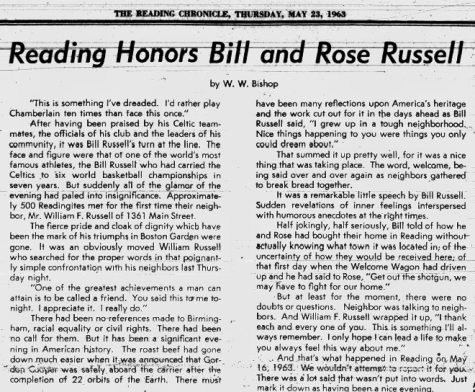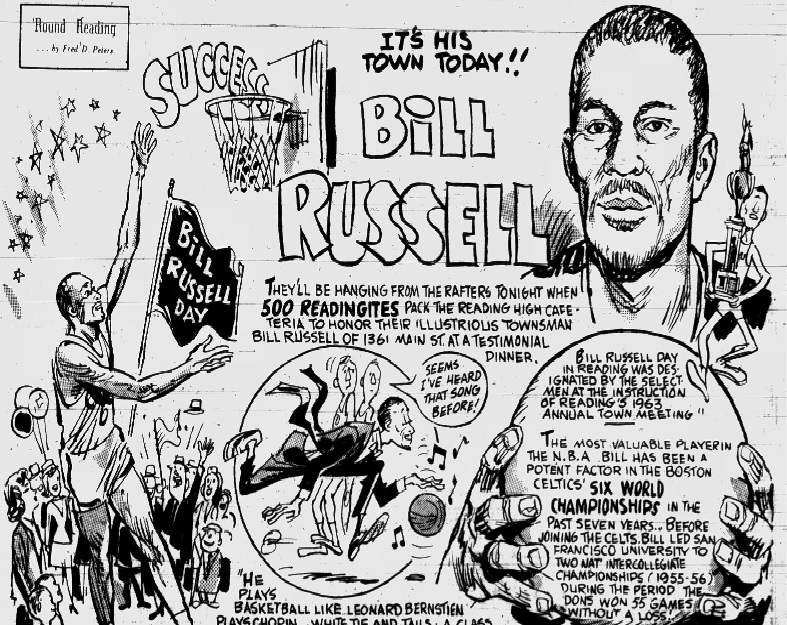The Day Bill Russell Came to RMHS
RMHS Cafeteria Hosted The Legend on May 16, 1963
An illustration from the May 16, 1963 edition of The Daily Times Chronicle commemorates Bill Russell Day in Reading.
May 16, 2023
You are walking down the stairs toward the cafeteria. You stand in line to get a sandwich or a slice of pizza, impatient about the long line and worried about how much time you get to eat and talk to your friends. This sounds like a typical day at RMHS. But imagine that sixty years ago, one of the greatest basketball players of all time–and the biggest winner in team sports history–was being honored in the RMHS cafeteria, and his NBA teammates and 500 town residents were there to see him.
Acts of Racism and Discrimination
It is no secret that Bill Russell lived in Reading for a while during his time with the Boston Celtics. We know from sources – like his daughter’s New York Times Magazine article – that he faced at least one act of racist hatred while in town in his ten years living here. Reading had, and still has, a rather homogenous population, with 88.6 percent of the population being white according to the 2020 census. So being one of the very few African-American families, as well as being a larger than life athlete and celebrity, was bound to draw attention–some motivated by bigotry. The first-person narrative written by his daughter made the whole country aware of the incident on the break-in of his 701 Haverhill Street home, where the perpetrators smashed his trophies, destroyed his pool table, and defecated in his bed. It is a stain in Reading’s history that will be difficult to erase.
Karen Russell’s article also recounts how Russell regularly came back from road trips to find his garbage barrels knocked over. When he reported those incidents to the police, Karen Russell reports that the police shrugged it off, telling Russell it was raccoons that knocked them over. However, when Russell applied for a gun permit, those “raccoons” never came back.
But the racism faced by Russell goes beyond what his daughter chronicles. According to a 2007 article in the Tewksbury/Wilmington edition of Wicked Local, Russell attempted to move into a “more affluent” Reading neighborhood in the summer of 1963. However, residents of the neighborhood signed a petition to prevent the seller from giving the house to Russell. After that failed, they attempted to pool their money together to buy the house before Russell did. Retired history teacher and current substitute teacher Mr. Carroll confirmed this incident, saying that he remembers that Russell was trying to buy a home on Prospect Street, and a group of men asked his father to sign the petition, to which he declined. Mr. Carroll looks back, proud of what his father did, but sad about what his neighbors were doing.
Talk of the Town
Russell ended up moving to 701 Haverhill St, where he lived until he moved out of Reading in 1969. The act of discrimination that limited Russell’s living arrangements in Reading–and the decision to honor him with a special day–motivated two memorable letters to the Daily Times Chronicle in the spring of 1963. First, an anonymous source wrote a letter published in the May 29, 1963 edition in which they questioned the people of their own town. The writer lived on the street of the house sale incident, and they were deeply ashamed. They question the integrity of the people of Reading, writing, “Were Mr. Russell an ordinary working man instead of a famous Celtic, I expect that he would attract as much attention as now, but of a far different sort.” The author finishes by asking, “Can any of your readers relate any redeeming incidents, other than our Bill Russell day, to prove that Reading’s residents are warm-hearted, sincere, and above all fair toward all of mankind?”
A direct response to this letter appeared one week later on June 6. In it, an African-American resident named John Hazelwood took exception to the anonymous letter writer’s characterization of Reading. Hazelwood wrote with a touch of sarcasm that he and his family found many benefits to living in Reading, including “wonder of wonders–new friends and neighbors of all faiths, who have welcomed us to town and treated us as privileged guests in their homes–from one end of Reading to the other.”
Though today’s Reading residents have mostly forgotten about Bill Russell Day, it is clear that Russell’s treatment in town was a hot topic in the spring of 1963.
An Evening of Honor
It is odd, however, that the house-buying incident reportedly happened just a couple months before he was honored at RMHS. In front of an audience of about 500 Reading residents, as well as several teammates and politicians, the whole night of May 16, 1963 was devoted to honoring William Felton Russell, and it was called Bill Russell Day. Mr. Carroll recalled, “The ‘63 event you talked about was held by the Chamber of Commerce. And the President of the Chamber of Commerce at the time was a fellow by the name of Larry O’Keefe, very prominent in the community back then.” He remembers the place being packed, with larger than life figures crammed into a school cafeteria with a town looking to see them. Almost the entire Celtics team was in the building, including Bob Cousy, Sam Jones, K.C. Jones, Tom Heinsohn, Tom Sanders and Jim Loscutoff. The Reading Chronicle’s coverage of the event says that even the NBA commissioner Maurice Podoloff “attempted” to make an appearance, though it is unclear if he did attend. Mr. Carroll, who was thirteen at the time of the event, was in attendance that night and said he got autographs from all eleven Celtics players there.

At the end of the night, it was Russell’s turn to thank the audience for their kind words. But he was not one for constant praise, and he did not enjoy public speaking. “This is something I’ve dreaded,” he said according to the Chronicle’s coverage, talking about this speech. “I’d rather play [Wilt] Chamberlain ten times than face this once.” But if he thought he struggled with public speaking, he clearly did not show it as he poetically talked about what this gathering meant to him. “One of the greatest achievements a man can attain is to be called a friend,” Russell said, “You said this to me tonight. I appreciate it. I really do.” That night, Russell spent time thanking some residents of the town in which others had discriminated against him.
It is hard to fathom the magnitude of importance this event has in Reading’s history. For context, one has to imagine that Jayson Tatum, Jaylen Brown, Marcus Smart and Rob Williams came to RMHS along with current NBA Commissioner Adam Silver. That would be an event that everyone in the community would remember and the town would memorialize it. And Russell’s status as the greatest champion in team sports history and a prominent voice in the struggle for civil rights in America makes his visit even more extraordinary.
Forgotten History
So why do very few people know about Bill Russell Day? If someone were to Google “Bill Russell Reading, MA” the first things that would pop up are the stories of a robbery of Russell’s Main Street home and the later break-in at his Haverhill Street home. Maybe Karen Russell’s 1987 article, which specifically mentions Reading and that act of racist vandalism, is a stain that rightly covers up any possibility of a positive spin on Russell’s time in Reading.
The one source, however, that did document Bill Russell Day, is a series of Daily Times Chronicle articles from May, 1963. But if one were to read the article, one might argue that Bill Russell might have wanted to keep this celebration from getting too big. Reports from the Daily Times Chronicle made it seem like a laid-back event that brought the community together. The closing paragraph of the article covering the event stated, “And that’s what happened in Reading on May 16, 1963. We wouldn’t attempt to report it for you. There was a lot said that wasn’t put into words. Just mark it down as having been a nice evening.” So perhaps this is just what the Russells wanted: an event to connect them with the town without drawing too much attention. Whatever the reason, Bill Russell Day in Reading has been mostly lost to history. “Which is too bad,” Mr. Carroll said, referring to the lack of attention received, “because it should be an honor for not only the Chamber of Commerce but for Larry O’Keefe.”
Mr. Carroll looks back very fondly at that time. He remembers being a young kid in awe of the Boston sports team and their rise to success. “It’s like it happened three weeks ago, to me,” he said, recalling every little detail of what life was like in Reading during the sixties. According to Mr. Carroll, to say Bill Russell had an illustrious career is an understatement. Mr. Carroll, for one, is proud that he got to live in the same town as one of the greatest athletes in sports history and he is proud of the way that – for at least one day – they celebrated Bill Russell as one of their own.

Dean Koulouris • May 18, 2023 at 7:11 am
Like Bill Carrol, I too have vivid memories of ‘back then’. My dad brought me to Russell’s house on Main St while collecting money for Little League. Bill wasn’t home but I remember standing in the living room while the family searched for money. They found 26 pennies on the mantle. Also I remember our family being upset when we learned after the fact that people kept the Russell’s from moving in to our neighborhood, we would have been neighbors.
Helen (Davis) Goodwin • Sep 22, 2023 at 6:50 pm
I too grew up in Reading and graduated in the class of 1963. Bill Russell and his family were very nice neighbors. I grew up about five house lots away from this family. Every day after school ( high school).I would go to the Russell’s house to babysit while Bill and Rose went to Boston for the games. They were the nicest people you could ever know!! Rose Russell even put on a big bridal shower for me at her house on Main Street in 1963. I met some nice actors,singers and ball players there too. Wonderful,wonderful people!! Helen(Davis) Goodwin
adviser • Sep 23, 2023 at 11:07 am
Thank you for reading our article and for sharing your personal story!
adviser • Sep 23, 2023 at 11:09 am
We appreciate that you read our story and took the time to share your recollection of the times. Thank you!